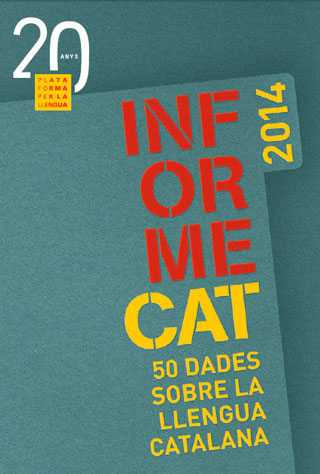11.04.2014 - 11:11
Catalan is a dynamic language in expansion, with a notable presence in various areas, in some cases much larger than expected given its demographics, but at the same time it suffers an inexplicable lack of official and legal recognition as well as unprecedented attacks from institutions like the Spanish government and various local governments. These ever more frequent, directed attacks on the Catalan language and which have as their principal objective stopping the process begun in Catalonia to decide its own future, may end up stopping the growth of our language. This is the main conclusion that can be gleaned from the InformeCAT 2014 (Catalan Report 2014) the annual report carried out by the Plataforma per la Llengua on the state of health of the Catalan language, and which was presented today.
The InformeCAT, which was created from various sources and studies that the group carried out over the past year, attempts to give a broad view of the health of the Catalan language, through fifty data points in various areas. The objective is to have a reference document that can serve as a thermometer for the current state and evolution of the language.
According to the document, Catalan enjoys good health in many areas: for the first time, our language has surpassed the figure of ten million speakers. In ten years, the number of speakers has risen by 750,000 and the number of people who know how to write it, by more than a million. It is also the seventh most learned by young people and the 14th most spoken language overall in the European Union. In addition, the use of the language by newcomers continues to grow; comprehension of Catalan among foreign residents of Catalonia has risen 21 points in the last ten years.
But this growth varies widely from territory to territory and also from environment to environment. For example, in contrast with this positive data, in territories like Valencia, the Franja de Ponent and the Balearic Islands, the language has slid backward thanks to the unprecedented attacks by the respective governments. In Valencia, oral comprehension has fallen 12 points since 1992. Or in the area of education, 155 school units in Valencia have been eliminated or are in danger of being eliminated in the 2014-2015 school year. With respect to the university level, Valencia trails the list with respect to the use of Catalan: no university in Valencia offers more than 25% of its classes in Catalan. Like in Valencia, the autonomous government in the Balearic Islands has also used the sensitive area of education as a way to attack the language. The Tractament Integral de Llengües (Integral Language Treatment) decree which marginalizes Catalan in school has outraged and mobilized the civil society in the Islands and has made the educational community react: more than 120,000 people demonstrated on the streets in Palma (population 869,000) in September to protest these measures of José Ramon Bauzà’s government.
Finally, the Aragon Law of Languages, which renames Catalan as “LAPAO” (Aragonese language of the Western Pyrenees) and turns back the timid advances at recognizing the use of Catalan in the area, has also gotten an important response, in this case from local politicians, who have joined together in a group of thirty area mayors who have pledged to undertake the necessary legal action to abolish the law.
This pointed political strategy throughout the territories where Catalan is spoken has been complemented by the well-known policies of the Spanish State to dismiss Catalan and refuse to recognize it in many areas. Two examples: Spain is the only state out of the 32 in the Schengen Area that doesn’t recognize as official the languages of more than 10% of its citizens, as is the case of Catalan.
And second, the Spanish State and its various governments that have had responsibilities in this matter are also the principal ones responsible for Catalan still not enjoying official status in the European Union. There are eleven official languages in the EU with fewer speakers than Catalan, an unusual, inexplicable situation. Further, linguistic discrimination on the part of the administration for using Catalan has not stopped: the 2013 Plataforma per la Llengua report detects 12 new cases.
By area, there are sectors in which Catalan has not been able to take off, or it has been implemented at a very slow pace, like in the legal system (this year 25% fewer rulings were given in Catalan, which in 2010 were only 14.5% of the total to begin with), in film (movies offered in Catalan grew only 1% from 2011, again, starting from a very low percentage, even though the number of moviegoers grew by 7%), and in children’s toys and games (less than 8% of toys include instructions in Catalan).
On the other hand, there are a number of positive data points in important sectors like culture. Two examples: the three most visited digital newspapers in Catalan have each surpassed a million monthly visitors, and in 2011 there were twice as many theater shows in Catalan than in Spanish. In the business world, it’s important to point out that more than 70% of Catalonia’s employees use Catalan at work and three out of four SMEs use Catalan to promote and contract employees.
But where Catalan shines the brightest is as one of the most active languages on the internet and in the world of new technologies. There are numerous data that demonstrate this fact: the Catalan version of Wikipedia, Viquipèdia, received a record number of visitors this year, and the four principal operating systems already offer versions in Catalan. On the Internet, six out of the seven most popular social networks have a version in Catalan, while one of the most popular world networks, Twitter, has more than 150,000 users of its Catalan version since July 2012.



